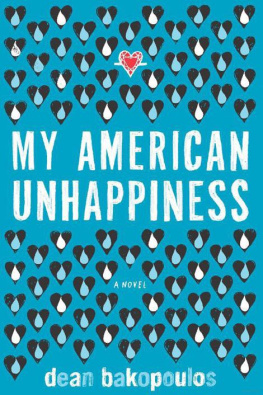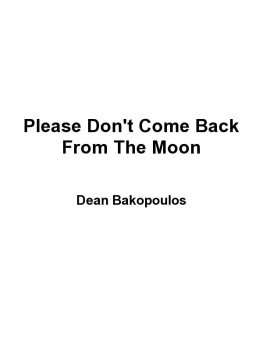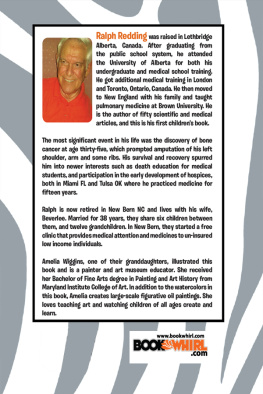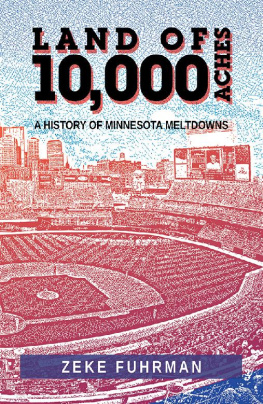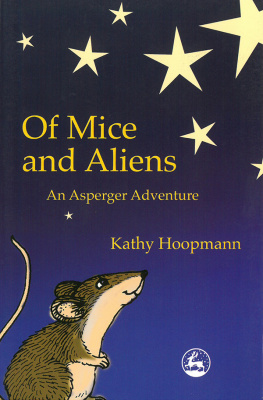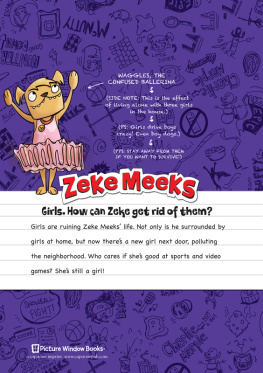Author's Note
The events, characters, and situations depicted in this book are purely fictional, and they have no rooting in the various experiences I had while working for the Wisconsin Humanities Council between 2001 and 2009. My time with the state humanities council was an enjoyable and stimulating experience made richer by the dedicated, incredibly hard-working and caring, warm people (particularly Dena Wortzel, Michael Kean, and Esther Mackintosh) who make up the world of the public humanities and the National Endowment for the Humanities.
Acknowledgments
I wish to thank the John Simon Guggenheim Memorial Foundation, the National Endowment for the Arts, and Joen Greenwood (via Shake Rag Alley in Mineral Point, Wisconsin) for incredibly crucial fellowships and support while I was working on this project. I'm also grateful for support from Iowa State University's Center for Excellence in the Arts and Humanities and the College of Liberal Arts and Sciences. My students and colleagues at Iowa State have all been remarkable and helpful, especially Steve Pett, Charles Kostelnik, Marissa Landrigan, and, of course, Big Bad Ben Percy, whose insane work ethic keeps me on task and whose sense of humor keeps me from self-pity. Similarly, my colleagues and students at Warren Wilson's MFA program have taught me a great deal about craft and the writing life, and for that I am grateful. Thanks to Dr. Peter Kish, chiropractic genius, as well as my pals Coleman, John Fetters, Julian Goldberger, Perrin Chiles, Darragh Kennan, Jessica Kennan, Joe "Blessed Are the Cheesemakers" Burns, Katie "The Cheesemaker's Wife" Burns, Natalie Bakopoulos, and Jeremiah Chamberlin. Thanks to Lorrie Moore, for crucial encouragement in a dark time, and Charlie Baxter, for a million kind words and one harsh letter. Thanks to Becky Saletan for her faith and good humor. Thanks to Jeff Bean, the teacher who started everything. Thanks to copy-editing genius Barbara Wood for the kind of eagle eye that is so necessary after eleven drafts. And finally, thanks to my wife, Amanda Okopski, who always supports the quitting of day jobs but never supports quitting on a manuscript; to my agent and unflappable friend, Amy Williams, who stayed with me in the desert; and to my editor, Adrienne Brodeur, who arrived with fresh horses and cold water, just in the nick of time.
About the Author
Dean Bakopoulos is the author of the novel Please Don't Come Back from the Moon, a New York Times Notable Book for 2005. The recipient of a Guggenheim Fellowship and a National Endowment for the Arts fellowship, he is also a playwright with the Alley Stage theater company in Mineral Point, Wisconsin. He teaches in the MFA Program in Creative Writing and Environment at Iowa State University, as well as the MFA Program for Writers at Warren Wilson College.
SPRING 2008
SUMMER 2008
AUTUMN 2008
1. Zeke Pappas is off to the Rotary Club luncheon.
N INE YEARS AGO, in the summer of 1999, I was hired to be the director of the Great Midwestern Humanities Initiative (GMHI), a federally funded program designed "to foster a greater sense of community, increase public literacy, and strengthen levels of civic engagement in the American heartland." The program was typical of the projects launched at the end of that optimistic and high-rolling decade, as its founders believed it could cease or at least slow the brain drain that was occurring in that region of the country, both the crumbling Rust Belt and the blighted Grain Belt. I was raised in Madison, Wisconsin, and I still live there, a city full of transplants where everybody's optimism about the heartland seems to outpace the reality of our condition: we are dying.
People have been leaving the Midwest for decades and they still are many decades later and nobody is particularly surprised. From the streets of Cleveland and Detroit and Gary, to the fertile fields of Wisconsin and Iowa and southern Indiana, the young people flee. They go south and west, to the newly cosmopolitan and sprawling cities like Atlanta and Orlando and Salt Lake; they deal with the heatit's worth it to them. I can imagine them sweating, those exiles, in newly purchased summer suits of linen and seersucker, in dresses that bare their still pale and overly broad shoulders. Some of the exiles head west to the great mountains and the deserts and the outdoorsy, freestyling existence that such places as Boulder and Bozeman and Tucson seem to promise. They go to sunny and arid places with high-tech corridors and solar energy projects. Some go directly to the coasts: to San Francisco or New York, those hubs of artistry and commerce with their diverse and teeming neighborhoods, the magnetic bustle of business and action, the sounds of foreign music and unknown spices wafting out of the windows and into the sky and streets. They do not stay here in the Midwest with its sagging and empty auto plants, steel factories running at half power, and farms plagued by unprofitable hogs, underpriced grain, silos in sore need of repair.
The founders of the Great Midwestern Humanities Initiative included a gaggle of congressional leaders, led by Wisconsin Republican Quince Leatherberry, an anti-immigration conservative from the state's wealthy Fifth District, who, despite his constant sermons on self-reliance and hard work, has never held a job outside of Capitol Hill and has lived, largely, on the fat of his father's land. Leatherberry, an unlikely ally for public humanities funding, was joined by H. M. Logan, a business leader and the chair of GMHI, as well as an odd alliance of advocates, vigorously paid lobbyists, and oftbewildered but generous businessmen who believed that in order to slow our regional brain drain, young Midwesterners simply needed to know the hallowed heritage of their homeland, to read the rich literature of their own region, and to understand the blessed uniqueness of their landscape and culture. Then they might stay!
It was also believed, by the founders, that the study of the humanities, in the broader sense, might enlighten the work force of the Midwest, ignite a wildfire of innovation and experimentation in the private sector, from automotives to agriculture, economic combustion engines fueled by the bright minds of Michigan and Wisconsin and Iowa and Minnesota and Ohio and Nebraska, digesting and ruminating upon the works of our own undervalued sons and daughters: Willa Cather and F. Scott Fitzgerald and Sinclair Lewis. If only the music of our own famous musicians and composersJohn Alden Carpenter, Benny Goodman, Miles Davis, Bob Dylanwere lodged forever in our internal melodies; if only we allowed the images of John Steuart Curry and Grant Wood to enliven our vision of place; if only we realized that we share the prairie with the same lines, light, and landscapes that inspired Frank Lloyd Wright and moved Aldo Leopoldif only, if only, then our engineers in Detroit and our productivity managers in Cleveland and our logistics coordinators in South Bend would discover new ideas and revolutionary technologies.
It was, as Representative Leatherberry said, "a real win-win."
"Oh, the humanities!" once exclaimed benefactor Howard Morgan Logan, after a particularly rousing Governor's Lecture in the Humanities by the visiting critic Stanley Fish. Logan, a retired oil man and closeted homosexual originally from Kenosha, turned to a harrumphing Congressman Leatherberry and whispered, tears in his eyes, "Oh, life!"
I was barely twenty-four the year I took this job, armed with a self-designed bachelor's degree in "The Narrative Text and Social Movements" from the University of Michigan, and I believed in many things, including the noble and mind-boggling mission of the GMHI: To encourage and advance civic engagement, commercial initiative, economic development, and regional pride in the American Midwest through the study and promotion of the humanities disciplines,

